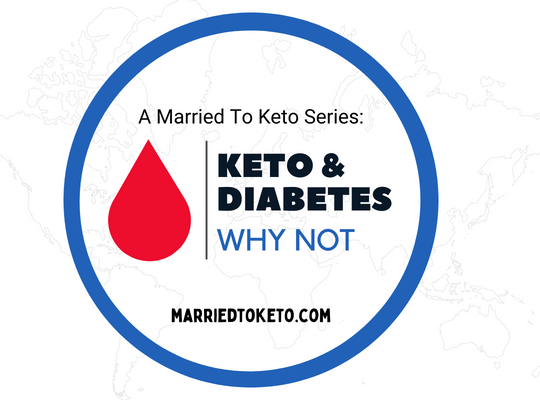Bill and I recently watched a documentary on keto (I know, we’re wild) and it was talking about using keto as a way to control diabetes. Since keto controls the amount of insulin your body needs, it seems like a no-brainer that those with diabetes should be on a keto diet. So, why aren’t more health professionals using keto to control diabetes?
The Role of Insulin in Diabetes
Insulin is a hormone that the body uses to allow sugar into the cells to produce energy. Our pancreas makes it and pushes it out into the bloodstream. The insulin opens the door to our cells for sugar to go in and this gives us energy. Because the insulin is helping sugar go into the cells, there isn’t as much sugar in our bloodstream. As the amount of sugar in our blood lowers, the amount of insulin produced decreases.
When our body can’t keep up with the amount of insulin it needs, we develop diabetes. With type 1 diabetes, our liver stops making insulin. This is usually a genetic issue or due to exposure to a virus. With type 2 diabetes, our bodies can’t keep up with the amount of sugar we take in. Type 3 is a type of diabetes most health professionals don’t acknowledge. It has to do with not having enough insulin but this affects the function of the brain.
Research Says We Can Use Keto to Control Diabetes
It makes sense that if we drastically reduce the insulin made by our bodies, it would help to control diabetes. Yet if you go to the American Diabetes Association website and type in “keto diet” you get absolutely 0 results. I know I’m biased, especially with this blog, but that seems kind of weird.
Type 1 diabetes is more complicated because your body simply doesn’t make insulin anymore. There can be more complex side effects. It’s really important that if you want to try keto as a way to manage your insulin levels that you keep in touch with a doctor. It seems like it would help, but everyone is different.

Using keto for type 2 diabetes is a more mainstream idea. Many articles I read recommend a low carb diet for managing this form of diabetes. Most health professionals don’t want to call it “keto” but they do say that the less insulin you need to produce, the better your health will be.
Type 3 diabetes is just controversial from start to finish. Health professionals say that calling Alzheimer’s is an oversimplification of the disease. It does appear from initial research that eating a low carb diet can help manage symptoms.
When Can’t You Use Keto to Control Diabetes?
With type 1 diabetes, as I said, it can get a little more complicated. People are taking insulin, and they have to be careful not to get too much insulin compared to their blood sugar levels. If you’re used to taking a certain amount, and then you reduce the amount you need by cutting down on carbs, it can be bad. Most people with type 1 diabetes I know check their blood sugar levels before taking insulin. If you do that, you should be fine (in my uneducated opinion).
The only thing that made sense to me of why someone might not use keto if they have type 1 diabetes is if they are already underweight. Honestly, I don’t know a lot about that, because that has never been my experience. That would require more research.
So Why Aren’t We Using Keto to Control Diabetes?
The only reason I can figure out why you wouldn’t use keto to control diabetes is politics. The medical community still tends to see keto as a fad diet. There are certainly exceptions. Bill had a wonderful doctor who diagnosed him with hyperinsulinism when others had thrown up their hands and told him to just lose weight. He told Bill to start keto or he would suffer kidney damage within 20 years. Other specialists have also gotten onboard, noting that his obesity would have killed him long before any side effects from keto might. But there are many others who judge our keto lifestyle with distaste.
True, we only have anecdotal research right now, but more and more that comes out is showing that we can do keto long-term. If you are struggling to control your diabetes, would it hurt anything to try to lower your carb count? Is keto worse than the other alternatives? When will it be less about the terms and more about the benefits?
Wendy





